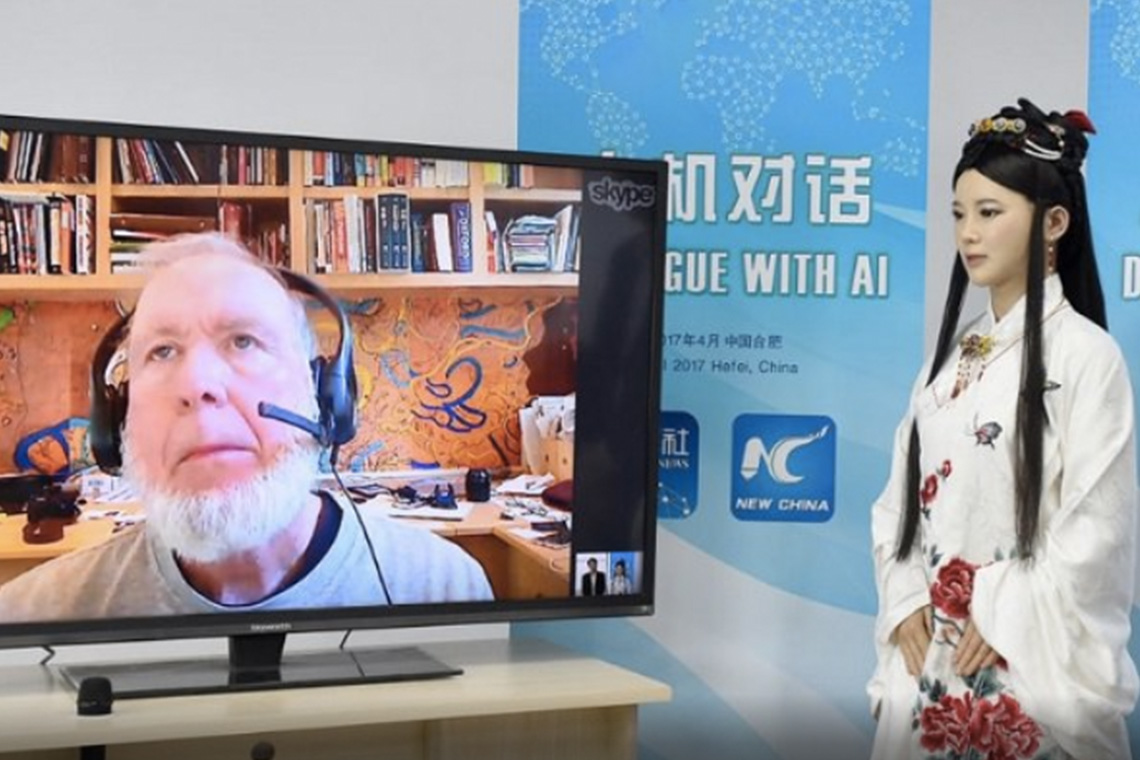The robot Chinese journalists are coming
A roundup of today’s top China news. Get this free daily digest delivered to your inbox by signing up at supchina.com/subscribe.

Robots rise as Chinese journalists give up on the profession
Xinhua News Agency breathlessly reports that it has “recently added a new member to its team, and he or she isn’t human,” but rather Jia Jia the robot, “a special Xinhua reporter who carried out an interview on…global AI experts and science and technology tycoons.” The state news agency says that its robot reporter “did a live interview with…a U.S. journalist and technology observer…the world’s first interactive conversation between an ‘AI reporter’ and a human being.”
Chinese news media might soon need all the robots it can get: On the China Media Project, David Bandurski laments a “progressive loss of professional journalism capacity in China’s media” in recent years.
Bandurski recalls a meeting two years ago “with some of the finest journalists to have worked in the Chinese media in the past two decades,” who “had broken major stories of corruption, malfeasance and cruelty, and who had, in the process, shaped the contemporary history of Chinese journalism.” Now, however, “all of them were busy with start-ups having little or nothing to do with journalism.” Low salaries and censorship are the two main factors driving journalists away from the profession, which is increasingly becoming “something to be endured only for a few years early in a career before one moves on to a job with real pay and a real future.”
Media companies themselves are hastening the departure from the profession of more experienced journalists: “Many media in China, old and new, routinely advertise journalism jobs by prioritizing applicants ‘under the age of 35.’”
The state and the spin on Chinese creation of U.S. jobs
Bloomberg summarizes a report by the Rhodium Group, which found that “employment by Chinese-owned firms in the U.S. has jumped ninefold since 2009 to 140,000 jobs.” Chinese foreign direct investment in the U.S. “grew at an average annual pace of 32 percent from 2010 to 2015, then soared 200 percent last year to $46 billion.” Mergers and acquisitions, including “HNA Group Co. buying networking and software distributor Ingram Micro Inc. for $6 billion and Haier Electronics Group Co. $5.4 billion purchase of General Electric Co.’s appliance business,” accounted for 96 percent of Chinese investment in the U.S. in 2016.
Meanwhile, Alibaba is making a public relations push for its potential role in the creation of U.S. jobs and the revival of American manufacturing. CNBC reports that the Chinese ecommerce giant will “host its first small business event in the U.S. this summer to try to convince American entrepreneurs that the company is on their side — and can help them reach millions of Chinese consumers.” The event, called “Gateway ’17,” will take place in Detroit, Michigan, in June and “the company is expecting more than 1,000 businesses from across the nation.” CNBC notes that “Alibaba will also have to convince attendees that their original businesses and ideas are safe from counterfeiters,” as it was named on the U.S. government’s “notorious markets” list for fakes last December.
All about women
In the run-up to the The China Project Women’s Conference on May 18 in New York, we’ve been featuring a series of articles and podcasts about female movers and shakers as well as issues of concern to women in China. They are:
- Chinese women are killing it in WeChat commerce, by Simone McCarthy
- Accomplishing what they could not at home: The bond between American and Chinese women, by John Pomfret
- Hard times for feminists in China, by Jiayun Feng
- The dire state of female representation in the Chinese government, by Cheng Li
- Virginia Kamsky: A life of business in China, on the Sinica Podcast
- Susan Thornton: What actually happened at Mar-a-Lago?, on the Sinica Podcast
- Who is Anna May Wong? Hollywood’s first Chinese-American icon, a The China Project video by Jia Guo
— Jeremy Goldkorn, Editor-in-Chief
This issue of the The China Project newsletter was produced by Sky Canaves, Lucas Niewenhuis, Jia Guo, and Jiayun Feng. More China stories worth your time are curated below, with the most important ones at the top of each section.
BUSINESS AND TECHNOLOGY:
Made in China, by robots
First labor, now robot labor: The hands that make and move goods in the world’s largest market may soon get a mechanical replacement. Bloomberg reports that “in 2016, China installed 90,000 new robots,” or one-third of the world’s total, and “30 percent more than the year before.” This makes China the world’s fastest-growing robotics market, as giant manufacturers and logistics firms compete and drive demand from around 800 Chinese robotics companies to develop machines that sort, weld, bolt, deliver, or even monitor pollution. If China succeeds in upgrading its manufacturing economy, which is currently still relatively labor-dependent compared with advanced manufacturing economies such as those of Germany or South Korea, it “may be able to stanch the flow of factories moving overseas.”
In some ways, the industry is still in its early stages of development. One engineer at Tsinghua University indicated that “some startups buy key components from Siemens or Fanuc, put them in a robot shell with an arm, and then slap on a Chinese brand name.” Still, the large players in the industry are not just messing around. Online retailer JD.com, for example, is rushing to automate its warehouses, and expects drones, driverless vehicles, and other specialized robots to deliver its packages in the not-too-distant future. It has already conducted experimental deliveries with drones in remote locations and robots on college campuses, and expects to quickly develop the technology.
- Amid scramble for influence, China scoops up Chevron’s gas fields in Bangladesh / Foreign Policy
China’s first major energy deal in Bangladesh will put it in competition with India and Japan. - Netflix has just found a back door into China / Tech in Asia
A licensing deal with iQiyi will make some Netflix original shows available to Chinese audiences, though each show will need individual approval from censors, meaning that the slightly open ”back door” can be slammed shut at any time. - Hyundai is caught in a perfect storm in China / Bloomberg
“They have the wrong positioning in China, were late to sell new cars and SUVs, and had weak brand loyalty.” - China’s hidden debt stirs investor angst as defaults rise / Bloomberg
POLITICS AND CURRENT AFFAIRS:
American declared guilty of spying after two years in detention
A years-long saga concerning Phan Phan-Gillis, a U.S. businesswoman also known as Sandy, who was accused of espionage and detained over two years ago, seems to be concluding: The New York Times reports (paywall) that on April 25, a judge in southern China finally declared her guilty and ordered her to be deported. However, as a written judgment has yet to be passed down — it is expected in the coming days — it is unclear if she will have to carry out a prison sentence before leaving the country. Her husband, Jeff Gillis, has advocated on her behalf from the U.S. throughout her detention. In August 2016, the Times reported (paywall) that he had appealed directly to President Barack Obama to raise the issue at last fall’s G20 summit in Hangzhou, China. Though U.S. diplomats had repeatedly pressed the Chinese to drop charges on Phan-Gillis, no information appears to be publicly available on what, if anything, came of these efforts or whether President Obama himself got involved.
The Chinese government has recently doubled down on efforts to root out spies in the country, offering cash rewards of up to $73,000 to residents in Beijing who inform on foreign espionage activity. State media also promoted the scheme with a propaganda video, which you can view translated and subtitled by The China Project here.
- Air China to resume flights to Pyongyang after three-week suspension / SCMP
Air China, the only Chinese airline with regular services to North Korea (which began in 2008), “will resume the flights between Beijing and Pyongyang on May 5 after a three-week suspension…amid fears that conditions facing the Korean Peninsula have become more volatile because of Pyongyang’s nuclear and ballistic tests.… But an Air China spokesman said at that time that the suspension was mainly on ticket sales and was only temporary.” - Ideological purge hits China universities with western ties / Financial Times (paywall)
The Party is conducting inspections at 29 top schools over a six-week period, searching for corruption and breaches of “political discipline.” The inspections were first announced in February this year. - Opinion: Why China’s new aircraft carrier should worry India / Bloomberg
“The Indian Navy has gone all-in on a strategy that emphasizes carrier battle groups,” yet India, with only one aircraft carrier, will still find itself far behind China’s navy when it commissions its second carrier, writes Mihir Sharma. - China’s austerity crackdown punishes nearly 20 percent fewer officials in Q1 / Financial Times (paywall)
Authorities may be “taking a softer approach to graft” ahead of the 19th National Congress elections for Party leadership change this fall. - China indicts former statistics bureau director Wang for bribery / Bloomberg
- Is Philippines offering Beijing an olive branch over South China Sea? / SCMP
- Japan’s ruling party heavyweight to attend China’s New Silk Road summit / Reuters
SOCIETY AND CULTURE:
Xinjiang bans names ‘that smack of religious extremism’
Radio Free Asia, a U.S. government-funded media organization, reports that “authorities in the northwestern region of Xinjiang have banned dozens of baby names with religious meanings that are widely used by Muslims elsewhere in the world,” including “Islam, Quran, Mecca, Jihad, Imam, Saddam, Hajj, and Medina.” The local government of Hotan, an oasis town in southern Xinjiang, had reportedly issued a list of banned names in 2015, but the ban apparently now applies to all of Xinjiang. Radio Free Asia called a police station in the regional capital of Urumqi, where the person who answered the phone confirmed that “overly religious” names are banned, and that “the most important thing here is the connotations of the name…[it mustn’t have] connotations of holy war or of splittism [Xinjiang independence].”
The name bans are part of a set of new rules issued by the Xinjiang government intended to counter religious extremism. The China Project could not locate a copy of the rules online, aside from a screenshot of them (in Chinese) circulating on Weibo. In this document, no specific names are mentioned — the rules simply prohibit “choosing names that smack of religious extremism” (起名渲染宗教狂热的 qǐmíng xuànrǎn zōngjiào kuángrè de). Therefore, the Radio Free Asia report’s list of prohibited names seems to be taken from the interview with the police station rather than from the rules themselves.
- China’s middle class suffers from insomnia, rarely has sex, and is very worried about its future / Quartz
“Top concerns regarding social issues include inflation, food safety, the government’s stricter restrictions on property purchases, and the notorious pollution plaguing many Chinese cities.” - Oops! Chinese defense ministry’s PLA poster a big Photoshop fail / SCMP
A poster meant to commemorate the 68th anniversary of China’s navy had the Liaoning aircraft carrier awkwardly photoshopped next to Russian fighter jets and U.S. ships. - Beijing enlists dancing grannies to deter jaywalkers / Sixth Tone
- Little-known [soccer player] Brazilian Fernandinho attempts to bridge cultural gap while playing in China / SCMP
- Italian police go on patrol at the Great Wall of China / Shanghaiist





